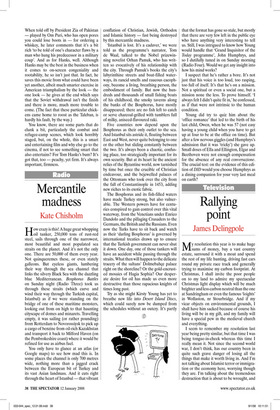Mercantile madness
Kate Chisholm
How crazy is this! A huge great whopping oil tanker, 250,000 tons of rust-red steel, sails through one of the narrowest, most beautiful and most populated sea straits on the planet. And it’s not the only one. There are 50,000 of them every year. Not quinqueremes these, or even stately galleons. But eyeless giants, lumbering their way through the sea channel that links the silvery Black Sea with the dazzling blue Mediterranean. Bosphorus Battles on Sunday night (Radio Three) took us through these straits (which curve and wind their way through the Turkish capital, Istanbul) as if we were standing on the bridge of one of these maritime monsters, looking out from on high to that haunting cityscape of domes and minarets. Travelling empty, it was sailing (or rather pounding) from Rotterdam to Novorossiysk to pick up a cargo of benzine from oil-rich Kazakhstan and transport it back to Milford Haven (on the Pembrokeshire coast) where it would be refined for use as airbus fuel.
You only have to glance at an atlas (or Google maps) to see how mad this is. In some places the channel is only 700 metres wide, nothing more than a jagged crack between the European bit of Turkey and its vast Asian landmass. And it cuts right through the heart of Istanbul — that vibrant conflation of Christian, Jewish, Orthodox and Islamic history — fast being destroyed by this mercantile madness.
‘Istanbul is lost. It’s a cadaver,’ we were told as the programme’s narrator, Tom de Waal, talked to the Nobel prizewinning novelist Orhan Pamuk, who has written so evocatively of his relationship with the city. Through Pamuk’s books the city’s labyrinthine streets and boat-filled waterways, its rancid smells and raucous cacophony, become a living, breathing person, the embodiment of family. But now the hundreds and thousands of small fishing boats of his childhood, the smoky taverns along the banks of the Bosphorus, have mostly disappeared; there are no fish left to catch or serve charcoal-grilled with tumblers full of milky, aniseed-flavoured raki.
Five countries now depend upon the Bosphorus as their only outlet to the sea. And Istanbul sits astride it, floating between East and West, never quite belonging to one or the other but sliding constantly between the two. It’s always been a chaotic, confusing place, too strategically important for its own security. But at its heart lie the ancient relics of the Byzantine world, now tarnished by time but once the crucible of Christian endeavour, and the bejewelled palaces of the Ottomans who took over the city from the fall of Constantinople in 1453, adding new riches to its exotic fabric.
The Bosphorus and its fish-filled waters have made Turkey strong, but also vulnerable. The Western powers have for centuries conspired to gain control over this vital waterway, from the Venetians under Enrico Dandolo and the pillaging Crusaders to the Germans, the British and the Russians. Even now the Turks have to sit back and watch as their ‘darling Bosphorus’ is governed by international treaties drawn up to ensure that the Turkish government can never shut it down. One day, one of those tankers will have an accident while passing through the straits. What then will happen to the delicate tracery of the sultans’ Dolmebahçe palace right on the shoreline? Or the gold-encrusted mosaics of Hagia Sophia? Our desperate desire for oil has made us even more destructive than those rapacious knights of times long past.
Try as she might Kirsty Young has yet to breathe new life into Desert Island Discs, which could surely now be dumped from the schedules without an outcry. It’s partly that the format has gone so stale, but mostly that there are very few left in the public eye who have anything very interesting to tell us. Still, I was intrigued to know how Young would handle that ‘Grand Inquisitor of the Today programme’, John Humphrys, and so I dutifully tuned in on Sunday morning (Radio Four). Would we get any insight into how his mind works?
I suspect that he’s rather a bore. It’s not just that his voice is too loud, too rasping, too full of itself. It’s that he’s on a mission. Not a spiritual or even a social one, but a mission none the less. To prove himself. ‘I always felt I didn’t quite fit in,’ he confessed, as if that were not intrinsic to the human condition.
Young did try to quiz him about the ‘office romance’ that led to the birth of his last child, Owen, when he was 57 (not easy having a young child when you have to get up at four to be at the office on time). But after a few nervous giggles (and Humphrys’s admission that it was ‘tricky’) she gave up. Small doses of Ella and Ellington, Elgar and Beethoven were not enough compensation for the absence of any real conversazione. The crucial test: on the evidence of this edition of DID would you choose Humphrys as a dining companion for your very last meal on earth?


























































 Previous page
Previous page